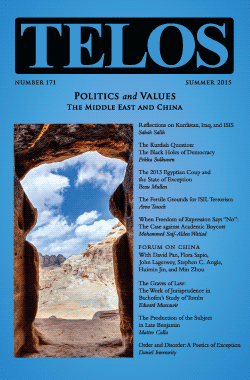Mohammed Saif-Alden Wattad’s “When Freedom of Expression Says ‘No’: The Case against Academic Boycott” appears in Telos 171 (Summer 2015). Read the full version online at the Telos Online website, or purchase a print copy of the issue in our store.
 It is this article’s assertion that calls for academic boycott contradict with the classic rationales of the right to free expression and with the peculiar features of the right to academic freedom. Freedom of expression is about developing a dialogue between two opposing opinions, wherein each claims to be the right one. Calls for academic boycott promote monologues rather than dialogues, thus creating the illusion that they represent the truth because they are not challenged. Moreover, protecting the right to academic freedom of individual academics is necessary for their fulfillment as researchers who can respect academic standards exclusively rather than institutional mandates. The self-fulfillment for an individual academic is enacted through the ability to convey messages that can compete against other views. Furthermore, the right to free expression is not merely about the right to talk, but also about the right to attempt to convince others of one’s views. This can be achieved only within a constitutional democracy—unlike formal democracy—where even if I were to assume that BDS supporters have the whole truth on their side, still the less favorable views; those which are boycotted, must be allowed to be voiced. In addition, allowing certain academics to call for an academic boycott establishes an unlawful discrimination directed against boycotted academics, solely because of their affiliation with their academic institutions. This is an irrelevant consideration, which treats the boycotted academics as a means, yet not ends, thus humiliating them and violating their right to dignity.
It is this article’s assertion that calls for academic boycott contradict with the classic rationales of the right to free expression and with the peculiar features of the right to academic freedom. Freedom of expression is about developing a dialogue between two opposing opinions, wherein each claims to be the right one. Calls for academic boycott promote monologues rather than dialogues, thus creating the illusion that they represent the truth because they are not challenged. Moreover, protecting the right to academic freedom of individual academics is necessary for their fulfillment as researchers who can respect academic standards exclusively rather than institutional mandates. The self-fulfillment for an individual academic is enacted through the ability to convey messages that can compete against other views. Furthermore, the right to free expression is not merely about the right to talk, but also about the right to attempt to convince others of one’s views. This can be achieved only within a constitutional democracy—unlike formal democracy—where even if I were to assume that BDS supporters have the whole truth on their side, still the less favorable views; those which are boycotted, must be allowed to be voiced. In addition, allowing certain academics to call for an academic boycott establishes an unlawful discrimination directed against boycotted academics, solely because of their affiliation with their academic institutions. This is an irrelevant consideration, which treats the boycotted academics as a means, yet not ends, thus humiliating them and violating their right to dignity.








